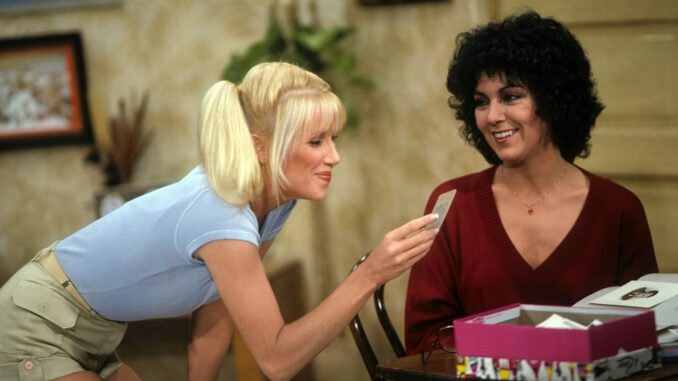
Although it made it through 8 successful and mainly hilarious seasons, “Three’s Company” hit all the usual problems that plague long-running sitcoms— the writing gets lazy and plots start to seem repetitive, actors leave to be replaced by others, the show jumps the shark, etc. But, in a sense, the show had a deeper problem: by 1984, its basic premise seemed less believable and relatable.
When the show began in 1977, it was all built on a zany but somewhat plausible premise: an old-fashioned and nosy landlord forbids unmarried men and women cohabitating in his building, but begrudgingly accepts the arrangement only because he is told that the man is gay and is therefore not having sex with his two attractive female roommates.
Not surprisingly, with that foundation much of the humor in the early years of the show came from situations in which the landlord (Mr. Roper) would almost catch Jack (who was portrayed as a goodhearted but girl-crazy cad who was, ironically, super-heterosexual) in circumstances that would prove he was straight. And Jack would find some wacky way of keeping the ruse going. Mr. Roper’s thinking that Jack was gay allowed Jack to live in the apartment, but it often came at the cost of being relentlessly mocked or demeaned by Mr. Roper. Meanwhile, and maybe to exact some revenge, Jack would usually add in some over-the-top effeminate gay gestures to also freak the nominally homophobic Mr. Roper out. All of this got big laughs from the audience. Remember, in 1970s and early 1980s TV, that kind of caricature and mockery was considered totally acceptable. As was the portrayal of many young, attractive, buxom women as interchangeable hyper-sexualized bimbos… and Three’s Company wasn’t shy about engaging that trope either.
The original premise started to wear thin by the time the Ropers moved and Mr. Furley was brought in as the new landlord. The idea that Jack would still need to pretend to be gay to justify living with his female roommates became more and more of a stretch. And it never really made sense that a landlord like Mr. Furley (a bachelor who dressed flamboyantly and fashioned himself a ladies man) would have a moral objection to adult men and women sharing an apartment. Plus, the show was set in Santa Monica, California…not exactly a quaint conservative town in middle America. It was still comedy gold—some of the funniest stuff came from the Jack and Furley exchanges—but the absurdity overtook the plausibility and it was thus just a matter of time.
By show’s end in 1984, the original premise and the gay caricature stuff seemed so silly and anachronistic that the show all but ignored it. And while some of the other running gags still worked, and the slapstick physical comedy (John Ritter was masterful) and some of the sexual innuendos and escapades were stil funny, without a compelling core premise underlying it, the show’s magic fizzled out. How many hijinks can folks go through before it all starts to feel a little tired?
Could an updated version of the show be popular today? Only if by “updated version” you mean the same zany spirit but with a totally different premise. Otherwise, I’d say it would be practically impossible to recreate “Three’s Company” today. A landlord who polices his adult tenants’ sexual activity? A straight man passing as gay to trick said landlord and then having to constantly “prove” his orientation by acting effeminate and coming on to him? Forget popular— I don’t see how you could even make a show like that today.
